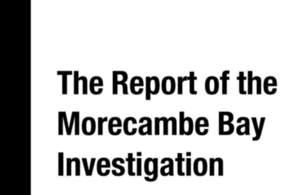Morecambe Bay Investigation Report published
Independent investigation into maternity and neonatal services in Morecambe Bay makes far-reaching recommendations to prevent future unnecessary deaths.

Morecambe Bay report
The Morecambe Bay Investigation was established by the Secretary of State for Health in September 2013 following concerns over serious incidents in the maternity department at Furness General Hospital (FGH).
Covering January 2004 to June 2013, the report concludes the maternity unit at FGH was dysfunctional and that serious failures of clinical care led to unnecessary deaths of mothers and babies.
The Investigation Panel also reviewed pregnancies at other maternity units run by University Hospitals of Morecambe Bay NHS Foundation Trust. It found serious concerns over clinical practice were confined to FGH.
The report makes 44 recommendations for the Trust and wider NHS, aimed at ensuring the failings are properly recognised and acted upon.
Announcing the report’s findings, Investigation Chairman Dr Bill Kirkup said:
All health care - everywhere - includes the possibility of error. The great majority of NHS staff know this and work hard to avoid it. They should not be blamed or criticised when errors occur despite their efforts.
But in return, all of us who work for the NHS owe the public a duty to be open and honest when things go wrong, most of all to those affected, and to learn from what has happened. This is the contract that was broken in Morecambe Bay.
The investigation report details 20 instances of significant failures of care in the FGH maternity unit which may have contributed to the deaths of 3 mothers and 16 babies. Different clinical care in these cases would have been expected to prevent the death of 1 mother and 11 babies. This is almost 4 times the frequency of such occurrences at the Trust’s other main maternity unit, at the Royal Lancaster Infirmary.
The report says the maternity department at FGH was dysfunctional with serious problems in 5 main areas:
-
Clinical competence of a proportion of staff fell significantly below the standard for a safe, effective service. Essential knowledge was lacking, guidelines not followed andwarning signs in pregnancy were sometimes not recognised or acted on appropriately.
-
Poor working relationships between midwives, obstetricians and paediatricians. There was a ‘them and us’ culture and poor communication hampered clinical care.
-
Midwifery care became strongly influenced by a small number of dominant midwives whose ‘over-zealous’ pursuit of natural childbirth ‘at any cost’ led at times to unsafe care.
-
Failures of risk assessment and care planning resulted in inappropriate and unsafe care.
-
There was a grossly deficient response from unit clinicians to serious incidents with repeated failure to investigate properly and learn lessons.
The report says proper investigations into serious incidents as far back as 2004 would have raised the alarm. It was not until 5 serious incidents occurred in 2008 that the reality began to emerge.
Dr Kirkup said:
There was a disturbing catalogue of missed opportunities, initially and mostsignificantly by the Trust but subsequently involving the North West Strategic Health Authority, the Care Quality Commission, Monitor, the Parliamentary and Health Service Ombudsman and the Department of Health.
Over the next 3years, there were at least seven opportunities to intervene that were missed. The result was that no effective action was taken until the beginning of 2012.
The report’s recommendations are far reaching, with 18 aimed at the Trust and 26 for the wider NHS and other organisations. Many contain specific target dates for completion.
For the Trust, key recommendations include: an apology to families; reviewing skills, training and duties of care; better team working; better risk assessment; an audit of maternity and paediatric services; better joint working across its sites; forging links with a partner Trust; reviewing incident reporting and investigation, complaint handling and clinical leadership; and improving the physical environment of the delivery suite at FGH.
The General Medical Council and Nursing and Midwifery Council are recommended to consider investigating the conduct of those involved in patient care.
A national review is also recommended of the provision of maternity and paediatric care in rural, isolated or difficult to recruit to areas.
Other recommendations call for action from Trusts, professional regulatory bodies, the CareQuality Commission, Monitor, the Department of Health, NHS England, nursing and midwifery organisations and the Parliamentary and Health Service Ombudsman.
Dr Kirkup said:
For the first time the full extent of the problems have been laid bare, independently and comprehensively. Those affected by the consequences deserve to see the nature and degree of failures acknowledged, after too long hearing them denied. I am sorry that it has taken so long to happen.
I would like to thank the families who have been harmed by these events. Without their courage in coming forward and their persistence in challenging what they were wrongly told, this investigation would not have come about.
The Investigation Panel included expert advisers in nursing, midwifery, obstetrics, paediatrics, governance and ethics.
Their report concludes that significant progress is being made at FGH and that the recommendations are intended to ensure they continue to be built on.